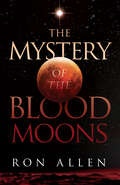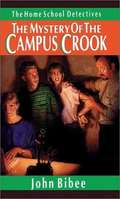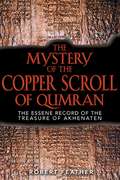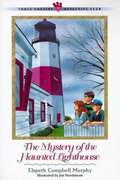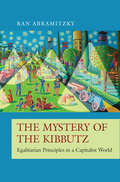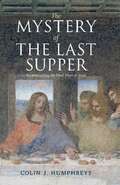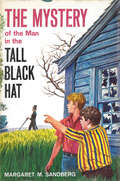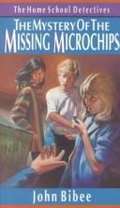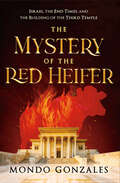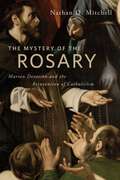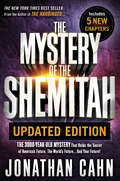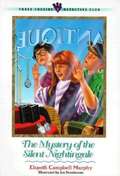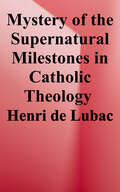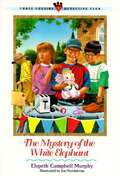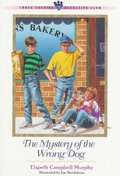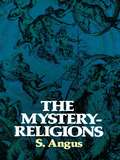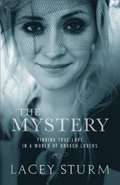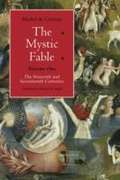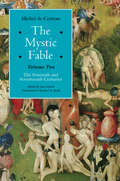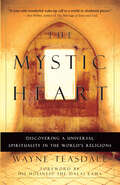- Table View
- List View
The Mystery of the Blood Moons
by Ron Allen&“The story of the stars is the story of the Creator Himself, told in His own words and pictures – and painted with fire across the expanse of the universe.&” The Scriptures tell us that the heavens declare God&’s glory. Yet, Christians avoid concentrating too intently on messages that might be written in the stars, for fear of aligning themselves with pagan practices. Nearly 30 years, the author of The Mystery of the Blood Moons began studying God&’s secrets as revealed in the sun, moon, stars, and planets. In this book, he gives particular attention to the apocalyptic intrigue surrounding the Blood Moon. Previous texts have highlighted the correlation between the timing of blood moons and important events in the nation of Israel. Here, the author applies his broad knowledge of cosmic symbols, and interprets what they disclose concerning the revival of the church and Christ&’s Second Advent. The Mystery of the Blood Moons will infuse believers with hope. It is a call to consider the wonders of the universe and attend to what the Creator is saying through them.
The Mystery of the Campus Crook (The Home School Detectives #4)
by John BibeeEmily and her other Home School Detective friends are giving a concert at the college where her father teaches. There they meet Astrid, a student who wants their help in recovering her high-powered laptop computer. Not only is it valuable, but it also contains the only copy of her Master's thesis. Astrid thinks it was stolen, but she acts suspicious herself. Emily and Josh wonder if more is involved than Astrid is letting on. Of course more is not involved--instead much more is! Once again the Home School Detectives use their wits, courage and help from a higher source to challenge a crook with a grand scheme. Includes a first chapter preview to the Home School Detectives next adventure, The Mystery of the Vanishing Cave.
The Mystery of the Copper Scroll of Qumran: The Essene Record of the Treasure of Akhenaten
by Robert FeatherIntroduces a radical new perspective on the historical foundations of monotheism, based on the enigma of the Copper Scroll of the Essenes. • Confirms the link between ancient Judaism and the pharoah Akhenaten. • Decodes the system of measurements encrypted on the Copper Scroll that has confounded scholars for over 50 years, leading to the identification of fabulous lost treasures.• Points to a radical new understanding of the origins of monotheism. The famous Dead Sea Scrolls comprise the oldest collection of Biblical documents ever discovered. Of the Dead Sea Scrolls, none has baffled experts more than the 2,000-year-old Copper Scroll, discovered in 1952 by a team of Bedouin led by Henri de Contenson of the Ecole Biblique in East Jerusalem. Appearing to be a list of buried treasure engraved on copper pieces, the Copper Scroll is considered to be the work of a secretive Jewish sect of devout Essenes, who lived by the Dead Sea around the time of Jesus. No one has been able to explain its meaning or discover any of the 64 locations where the Biblical treasures it lists were buried. Robert Feather, combining his background as a metallurgist with his journalistic expertise, has unraveled the enigma of the Copper Scroll in a fascinating study that takes the reader on a journey from ancient Mesopotamia, through Canaan, into Egypt, and back to the shores of the Dead Sea. His exploration links the scroll to the ancient Egyptian king Akhenaten, confirming a long suspected influence of this pharaoh's religious beliefs on those of the Hebrews. The author's findings not only reveal the locations of most of the treasures listed on the Copper Scroll, but they also point to a radical new understanding of the origins of monotheism--the basis of the three great religions of Judaism, Islam, and Christianity.
The Mystery of the Haunted Lighthouse (Three Cousins Detective Club #7)
by Elspeth Campbell MurphyTHREE COUSINS DETECTIVE CLUB #7 It's Sarah-Jane, Timothy, and Titus from the Three Cousins Detective Club! These ,three ten-year-olds are ready to learn about the Fruits of the Spirit while solving more exciting, adventure-filled mysteries! In The Mystery of the Haunted Lighthouse, Sarah-Jane Cooper and her detective cousins are invited to explore an old lighthouse Mr. Cooper's friend is planning to buy. Sarah-Jane is excited about her first chance to see a real lighthouse, but she can't help thinking it looks a little spooky. Is it just her imagination, or is someone trying to scare them away? It's up to the TCDC to unmask the lighthouse's secret! Theme: Faithfulness
The Mystery of the Kibbutz: Egalitarian Principles in a Capitalist World
by Ran AbramitzkyHow the kibbutz movement thrived despite its inherent economic contradictions and why it eventually declinedThe kibbutz is a social experiment in collective living that challenges traditional economic theory. By sharing all income and resources equally among its members, the kibbutz system created strong incentives to free ride or—as in the case of the most educated and skilled—to depart for the city. Yet for much of the twentieth century kibbutzim thrived, and kibbutz life was perceived as idyllic both by members and the outside world. In The Mystery of the Kibbutz, Ran Abramitzky blends economic perspectives with personal insights to examine how kibbutzim successfully maintained equal sharing for so long despite their inherent incentive problems.Weaving the story of his own family’s experiences as kibbutz members with extensive economic and historical data, Abramitzky sheds light on the idealism and historic circumstances that helped kibbutzim overcome their economic contradictions. He illuminates how the design of kibbutzim met the challenges of thriving as enclaves in a capitalist world and evaluates kibbutzim’s success at sustaining economic equality. By drawing on extensive historical data and the stories of his pioneering grandmother who founded a kibbutz, his uncle who remained in a kibbutz his entire adult life, and his mother who was raised in and left the kibbutz, Abramitzky brings to life the rise and fall of the kibbutz movement.The lessons that The Mystery of the Kibbutz draws from this unique social experiment extend far beyond the kibbutz gates, serving as a guide to societies that strive to foster economic and social equality.
The Mystery of the Last Supper: Reconstructing the Final Days of Jesus
by Colin J. HumphreysFor hundreds of years, we thought we knew what happened during Jesus' last days. Holy Thursday, Good Friday and Easter Sunday are not only observed by Christians around the world, but are also recognized in calendars and by non-practitioners as commemorating the true timeline of events in the life of Christ. But apparent inconsistencies in the gospel accounts of Jesus' final week have puzzled Bible scholars for centuries. <p><p> In The Mystery of the Last Supper, Colin Humphreys uses science to reveal the truth about Jesus' final days. Reconciling conflicting Gospel accounts and scientific evidence, Humphreys reveals the exact date of the Last Supper in a definitive new timeline of Holy Week.
The Mystery of the Man in the Tall Black Hat
by Margaret M. SandbergIt&’s the first day of summer, and preteens Tod and Barney are going to make the most of it. Off they go into the fun-filled woods and marshes, where they find frog eggs, rabbits, tadpoles, and an Abraham Lincoln-like character with a stovepipe hat and cane. Who is this weirdo anyway? The siren at the mental hospital blasted about the same time the summer adventurers spotted the strange man. Could he be—?Tod and Barney are two energetic boys whose antics and excursions will bring many a laugh from the juvenile reader. Chubby Barney seems to eat one meal a day—all day long. And he&’s always dragging along 99-percent-useless items, just in case!Imaginative Tod constantly comes up with new ideas for summer projects, from building tadpole ponds to feeding uncooperative rabbits to finding out who the freak in the tall black hat is. Both fellows are a little afraid (though they won&’t admit it) of the mysterious man. How does he suddenly appear from nowhere and then vanish again just as quickly? Is he some kind of superhuman creature or just a crackpot, or what?The Mystery of the Man in the Tall Black Hat makes an entertaining story for the juvenile set. Its exciting portrayal of junior happenings and a touch of mystery keep the reader hanging on until he reaches a surprise ending. The book shows daily Christianity in action and presents Christ as the one true Savior and Friend.Who is &“the man in the tall black hat&”? Read on and find out for yourself!
The Mystery of the Man in the Tall Black Hat
by Margaret M. SandbergIt&’s the first day of summer, and preteens Tod and Barney are going to make the most of it. Off they go into the fun-filled woods and marshes, where they find frog eggs, rabbits, tadpoles, and an Abraham Lincoln-like character with a stovepipe hat and cane. Who is this weirdo anyway? The siren at the mental hospital blasted about the same time the summer adventurers spotted the strange man. Could he be—?Tod and Barney are two energetic boys whose antics and excursions will bring many a laugh from the juvenile reader. Chubby Barney seems to eat one meal a day—all day long. And he&’s always dragging along 99-percent-useless items, just in case!Imaginative Tod constantly comes up with new ideas for summer projects, from building tadpole ponds to feeding uncooperative rabbits to finding out who the freak in the tall black hat is. Both fellows are a little afraid (though they won&’t admit it) of the mysterious man. How does he suddenly appear from nowhere and then vanish again just as quickly? Is he some kind of superhuman creature or just a crackpot, or what?The Mystery of the Man in the Tall Black Hat makes an entertaining story for the juvenile set. Its exciting portrayal of junior happenings and a touch of mystery keep the reader hanging on until he reaches a surprise ending. The book shows daily Christianity in action and presents Christ as the one true Savior and Friend.Who is &“the man in the tall black hat&”? Read on and find out for yourself!
The Mystery of the Messed-up Wedding
by Elsbeth Campbell MurphyA wedding ring is missing, and the wedding is today! Can Tim, Ti, and Sarah-Jane find the ring before the ceremony begins? The bride and groom need it when they make their special promises to each other. Why would someone want to mess up a wedding? The three cousins intend to find out! When Timothy, Titus, and Sarah-Jane, the three cousins, get together the most ordinary events turn into mysteries. So they've formed the T.C.D.C. (That's the Three Cousins Detective Club.) And while the three cousins are solving mysteries, they're also learning about the Ten Commandments and living God's way.
The Mystery of the Mexican Graveyard (The Home School Detectives #3)
by John BibeeWhen Carlos and Julie Brown go on a short missions trip with their parents to Mexico, odd things start happening. Many report seeing a ghost at the graveyard and the orphanage. The pastor and several children suddenly get ill. And two mysterious men in town warn that the orphanage is in danger. Suspicious about the ghost, Carlos begins an investigation into the strange events. Following the clues of bits of mud, pieces of candy and a watch that glows in the dark, he works to uncover a plot that is much bigger than the little Mexican town he is visiting. Probe this dark mystery with Carlos and his friends at the orphanage as they strive to reveal the truth.
The Mystery of the Missing Microchips (The Home School Detectives #2)
by John BibeeWhen Carlos and the others don't show up for ice cream, Julie and Emily start looking for them. Soon they find not only their friends' abandoned bicycles but also several small computer chips. When a strange man with a red beard shows up, wanting to know everything about the chips, the mystery deepens. Join the Home School Detectives as they are swept into a high-stakes game of high-tech crime. It's a case that is bigger than they could ever imagine.
The Mystery of the Red Heifer: Israel, the End Times, and the Building of the Third Temple
by Mondo GonzalesOne of the most significant yet enigmatic symbols in biblical prophecy is the red heifer. By the end of this book, you will understand the prophetic significance of the Red Heifer movement and the preparations made to build the Third Temple. For centuries, scholars, theologians, and believers have awaited the emergence of the perfect red heifer, a crucial element that many believe will set the stage for the construction of the long-awaited third temple in Jerusalem—a temple that must be rebuilt before the Second Coming of Christ. The existence of a perfect red heifer is seen as a sign that the final events foretold in the Book of Revelation—including the rise of the Antichrist, the great tribulation, and Jesus&’ return—are on the horizon. Devout Jews in Israel and around the globe have been preparing the Temple Mount for the third temple&’s construction for years. Yet one critical piece has been missing—the red heifer. With the arrival of five red heifers in Israel, this book investigates their prophetic significance and the extraordinary events that could soon follow. Examining the prophetic visions of Daniel, Jesus, Paul, and John, this book unravels the connections between the red heifer, the third temple, the covenant of Daniel 9:27, and the &“day of the Lord&” in 2 Thessalonians 2. While reading, you will uncover valuable insights in the prophetic text such as: Why Jewish rabbis believe the red heifer is essential for the building of the third temple How the ancient red heifer ritual is connected to the ministry of Jesus What the red heifer ceremony may signify for the future The inside scoop of how the five red heifers were found and sent to Israel Where are the red heifers now and when will the ceremony take place Drawing on insights from prominent prophecy teachers, this book is an essential guide for anyone seeking to understand the pivotal role of the red heifer in biblical prophecy and the unfolding of end-time events.
The Mystery of the Rosary: Marian Devotion and the Reinvention of Catholicism
by Nathan D MitchellEver since its appearance in Europe five centuries ago, the rosary has been a widespread, highly visible devotion among Roman Catholics. Its popularity has persisted despite centuries of often seismic social upheaval, cultural change, and institutional reform. In form, the rosary consists of a ritually repeated sequence of prayers accompanied by meditations on episodes in the lives of Christ and Mary. As a devotional object of round beads strung on cord or wire, the rosary has changed very little since its introduction centuries ago. Today, the rosary can be found on virtually every continent, and in the hands of hard-line traditionalists as well as progressive Catholics. It is beloved by popes, professors, protesters, commuters on their way to work, children learning their “first prayers,” and homeless persons seeking shelter and safety.Why has this particular devotional object been so ubiquitous and resilient, especially in the face of Catholicism’s reinvention in the Early Modern, or “Counter-Reformation,” Era? Nathan D. Mitchell argues in lyric prose that to understand the rosary’s adaptability, it is essential to consider the changes Catholicism itself began to experience in the aftermath of the Reformation.Unlike many other scholars of this period, Mitchell argues that after the Reformation Catholicism actually became more innovative and diversified rather than retrenched and monolithic. This innovation was especially evident in the sometimes “subversive”; visual representations of sacred subjects, such as in the paintings of Caravaggio, and in new ways of perceiving the relation between Catholic devotion and the liturgy’s ritual symbols. The rosary was thus involved not only in how Catholics gave flesh to their faith, but in new ways of constructing their personal and collective identity. Ultimately, Mitchell employs the history of the rosary, and the concomitant devotion to the Virgin Mary with which it is associated, as a lens through which to better understand early modern Catholic history.
The Mystery of the Shemitah Updated Edition: The 3,000-Year-Old Mystery That Holds the Secret of America's Future, the World's Future...and Your Future!
by Jonathan CahnNew York Times Best Seller! Over 2,700 5-Star Reviews From the author that brought you NEW YORK TIMES best sellers The Book of Mysteries, The Harbinger, and The Paradigm with over 3 MILLION copies sold"Rabbi Jonathan Cahn is a Jewish prophet who has been chosen to reveal end-time mysteries—vital material to put the last-days puzzle together!" —Sid Roth | Host, It&’s Supernatural! "The Mystery of the Shemitah is a detailed, compelling, and provocative book for anyone seeking answers to the future of America and the world." —Marcus D. Lamb | Founder, president, Daystar Television Network "The Mystery of the Shemitah is the most amazing thing I have ever read! Brilliant and stunning . . . sobering . . . humbling . . . it is undeniable truth. It is one of the most important books of our lifetime!" —Joseph Farah | Founder, WND The Shemitah occurs every seven years. Has God already given us clues as to WHAT WILL HAPPEN NEXT? The Shemitah (shmee-TA), or Sabbath year, is the seventh year of the seven-year agricultural cycle mandated by the Torah for the land of Israel. Understanding this seven-year pattern is essential for understanding the prophecy and mysteries of the Bible that are still applicable today. In The Mystery of the Shemitah Updated Edition you will discover new insight on current events such as: How the Great Depression and other economic events fit into the ShemitahHow stock market crashes in 2015 were linked to the period of nullification at the end of the ShemitahHow the Shemitah of 2015 affected economies worldwideHow the pattern of sevens predicted 9/11 to the exact hourHow the World Trade Center was conceived, started, finished, and destroyed in Shemitah yearsHow the rise—and possibly the fall—of America can be linked to the year of the ShemitahAnd much more…
The Mystery of the Silent Nightingale (Three Cousins Detective Club #2)
by Elspeth Campbell MurphyTHREE COUSINS DETECTIVE CLUB 2 It's Sarah-Jane, Timothy, and Titus from the Three Cousins Detective Club! These three ten-year-olds are ready to learn about the Fruits of the Spirit while solving more exciting, adventure-filled mysteries! In The Mystery of the Silent Nightingale, Sarah-Jane Cooper needs a special gift for Kelly, her lifelong babysitter and friend. When Sarah-Jane spots a silver locket in the antique store window, she decides it would be perfect for Kelly. But then the locket mysteriously appears on her babysitter's doorstep! Who gave Kelly the necklace? Sarah-Jane and her cousins jump in to uncover another thrilling mystery! Theme: Joy An exciting series of chapter books for readers ages 7-10 featuring the escapades of the famous detective-cousins Timothy, Titus, and Sarah-Jane.
The Mystery of the Supernatural (Milestones i n Catholic Theology Series)
by Henri De LubacFirst published in 1965, this book represents a refinement and further development of the core thesis that Henri de Lubac had originally put forward many years earlier in a bold and controversial work in which he first called into question the idea of pure nature.
The Mystery of the Vanishing Cave (The Home School Detectives #5)
by John BibeeIt was just like any other summer week at Camp Friendly Waters until Rebecca, Julie and Emily discovered a small opening to a large cave. Inside they found tools and weapons left by an ancient tribe of Native Americans. But when they brought others back the next day to see the cave, it was gone. How did the cave disappear? Where did the skeleton that they found in the cave come from? Why was someone trying to scare Rebecca and the others? Why did Mary Littledove keep avoiding them? Read to the surprising conclusion of one of the toughest cases the Home School Detectives have ever faced.
The Mystery of the White Elephant (Three Cousins Detective Club #1)
by Elspeth Campbell MurphyIt's Titus, Timothy, and Sarah-Jane from the Three Cousins Detective Club! The three ten-year-olds are ready to learn about the Fruits of the Spirit while solving more exciting, adventure-filled mysteries! In The Mystery of the White Elephant, a swap meet is taking place at Timothy Dawson's church, and the three cousins are hoping to find the perfect "white elephant" gift to buy. When a cookie jar mysteriously disappears, Timothy, Titus, and Sarah-Jane decide it's a job for the "TCDC"! The problem is, who in the world would steal a white elephant?
The Mystery of the Wild Surfer (Ladd Family Adventure #6)
by Lee RoddyJosh Ladd encounters a series of life-threatening situations when he befriends a mysterious young surfer named Duke.
The Mystery of the Wrong Dog (Three Cousins Detective Club #3)
by Elspeth Campbell MurphyIt's Timothy, Titus, and Sarah-Jane from the Three Cousins Detective Club! These three ten-year-olds are ready to learn about the Fruits of the Spirit while solving more exciting, adventure-filled mysteries! In The Mystery of the Wrong Dog, Titus McKay has been placed in charge of his elderly neighbor's crabby Yorkshire terrier, Kingsley--and Titus plans to show his parents he's ready for a dog of his own. But suddenly grumpy Kingsley turns into a sweet, lovable dog! What happened to Kingsley? It's up to Titus, Timothy, and Sarah-Jane to solve the mystery! Theme: Peace
The Mystery-Religions
by S. AngusWhat is the strange fascination of the Mystery-Religions for the ancient world and today, some 2,000 years later, for moderns? Why are these colorful ancient cults so little known, all information about them suppressed or distorted by centuries of official religion in Europe? What did these ancient beliefs have that exacted the respect of Socrates, Plato, Virgil, Apuleius, and other great men of the classical age? Was the religion that stamped them out, Christianity, itself originally a Mystery-Religion, with secret teachings that only initiates could comprehend and psychological techniques not generally revealed?This volume, generally considered the most useful single work in English on the subject, attempts to answer such questions, while at the same time offering a sound, solid background in the various forms of religious experience that are grouped together under the term Mystery-Religions. From the Eleusinian mysteries of ancient Greece through the Asiatic cults of Cybele, the Magna Mater, and Attis; the strange rompings of the Dionysian groups; Orphics with their impact on Greek philosophy; the Mysteries emergent from Egypt -- Hermes Trismegistos, the Pymander, Isis, and Osiris; on up to the religion that swept the Near East and Europe, carried by the Roman legions, and that almost became central for us today -- Mithraism.Each of these religions offered something to its devotees that the older ethnic and state religions could not: a sense of the value of the individual; heightened areas of experience, even to the manipulations of sensory experience; psychological insights that are only now being appreciated. Yet they all died out within a couple of centuries of the Christian era, Gnosticism (apart from a few vestigial groups in the Near East and Europe) subsuming their heritage last.
The Mystery: Finding True Love in a World of Broken Lovers
by Lacey SturmLacey Sturm wants to share her journey from heartbreak to wholeness with young women. In The Mystery, Sturm helps readers understand that any loving relationship begins with knowing your own identity in Christ.
The Mystic Fable, Volume 1: The Sixteenth And Seventeenth Centuries
by Michel De Certeau Michael B. SmithThe culmination of de Certeau's lifelong engagement with the human sciences, this volume is both an analysis of Christian mysticism during the sixteenth and seventeenth centuries and an application of this influential scholar's transdisciplinary historiography.
The Mystic Fable, Volume Two
by Michel De Certeau Michael B. Smith Luce GiardMore than two decades have passed since Chicago published the first volume of this groundbreaking work in the Religion and Postmodernism series. It quickly became influential across a wide range of disciplines and helped to make the tools of poststructuralist thought available to religious studies and theology, especially in the areas of late medieval and early modern mysticism. Though the second volume remained in fragments at the time of his death, Michel de Certeau had the foresight to leave his literary executor detailed instructions for its completion, which formed the basis for the present work. Together, both volumes solidify Certeau's place as a touchstone of twentieth-century literature and philosophy, and continue his exploration of the paradoxes of historiography; the construction of social reality through practice, testimony, and belief; the theorization of speech in angelology and glossolalia; and the interplay of prose and poetry in discourses of the ineffable. This book will be of vital interest to scholars in religious studies, theology, philosophy, history, and literature.
The Mystic Heart: Discovering a Universal Spirituality in the World's Religions
by Wayne TeasdaleDrawing on experience as an interreligious monk, Brother Wayne Teasdale reveals the power of spirituality and its practical elements. He combines a profound Christian faith with an intimate understanding of ancient religious traditions.
